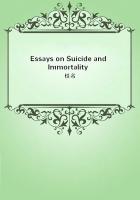"Where is she buried?" the traveller inquired.
"Beside her mother," said Henchard, in the same stolid tones.
"When did she die?"
"A year ago and more," replied the other without hesitation.
The sailor continued standing. Henchard never looked up from the floor.
At last Newson said: "My journey hither has been for nothing! I may as well go as I came! It has served me right. I'll trouble you no longer."Henchard heard the retreating footsteps of Newson upon the sanded floor, the mechanical lifting of the latch, the slow opening the closing of the door that was natural to a baulked or dejected man; but he did not turn his head. Newson's shadow passed the window. He was gone.
Then Henchard, scarcely believing the evidence of his senses, rose from his seat amazed at what he had done. It had been the impulse of a moment.
The regard he had lately acquired for Elizabeth, the new-sprung hope of his loneliness that she would be to him a daughter of whom he could feel as proud as of the actual daughter she still believed herself to be, had been stimulated by the unexpected coming of Newson to a greedy exclusiveness in relation to her; so that the sudden prospect of her loss had caused him to speak mad lies like a child, in pure mockery of consequences. He had expected questions to close in round him, and unmask his fabrication in five minutes; yet such questioning had not come. But surely they would come; Newson's departure could be but momentary; he would learn all by inquiries in the town; and return to curse him, and carry his last treasure away!
He hastily put on his hat, and went out in the direction that Newson had taken. Newson's back was soon visible up the road, crossing Bull-stake.
Henchard followed; and saw his visitor stop at the King's Arms, where the morning coach which had brought him waited half-an-hour for another coach which crossed there. The coach Newson had come by was about to move again.
Newson mounted; his luggage was put in, and in a few minutes the vehicle disappeared with him.
He had not so much as turned his head. It was an act of ****** faith in Henchard's words - faith so ****** as to be almost sublime. The young sailor who had taken Susan Henchard on the spur of the moment and on the faith of a glance at her face, more than twenty years before, was still living and acting under the form of the grizzled traveller who had taken Henchard's words on trust so absolute as to shame him as he stood.
Was Elizabeth-Jane to remain his by virtue of this hardy invention of a moment? "Perhaps not for long," said he. Newson might converse with his fellow-travellers, some of whom might be Casterbridge people; and the trick would be discovered.
This probability threw Henchard into a defensive attitude, and instead of considering how best to right the wrong, and acquaint Elizabeth's father with the truth at once, he be-thought himself of ways to keep the position he had accidentally won. Towards the young woman herself his affection grew more jealously strong with each new hazard to which his claim to her was exposed.
He watched the distant highway expecting to see Newson return on foot, enlightened and indignant, to claim his child. But no figure appeared.
Possibly he had spoken to nobody on the coach, but buried his grief in his own heart.
His grief! - what was it, after all, to that which he, Henchard, would feel at the loss of her? Newson's affection, cooled by years, could not equal his who had been constantly in her presence. And thus his jealous soul speciously argued to excuse the separation of father and child.
He returned to the house half expecting that she would have vanished.
No; there she was - just coming out from the inner room, the marks of sleep upon her eyelids, and exhibiting a generally refreshed air.
"O father!" she said, smiling. "I had no sooner lain down that I napped, though I did not mean to. I wonder I did not dream about poor Mrs Farfrae, after thinking of her so; but I did not. How strange it is that we do not often dream of latest events, absorbing as they may be.""I am glad you have been able to sleep," he said, taking her hand with anxious proprietorship - an act which gave her a pleasant surprise.
They sat down to breakfast, and Elizabeth-Jane's thoughts reverted to Lucetta. Their sadness added charm to a countenance whose beauty had ever lain in its meditative soberness.
"Father," she said, as soon as she recalled herself to the outspread meal, "it is so kind of you to get this nice breakfast with your own hands, and I idly asleep the while.""I do it every day," he replied. "You have left me; everybody has left me; how should I live but by my own hands.""You are very lonely, are you not?"
"Ay, child - to a degree that you know nothing of! It is my own fault.
You are the only one who has been near me for weeks. And you will come no more.""Why do you say that? Indeed I will, if you would like to see me."Henchard signified dubiousness. Though he had so lately hoped that Elizabeth-Jane might again live in his house as daughter, he would not ask her to do so now. Newson might return at any moment, and what Elizabeth would think of him for his deception it were best to bear apart from her.
When they had breakfasted his stepdaughter still lingered, till the moment arrived at which Henchard was accustomed to go to his daily work.
Then she arose, and with assurances of coming again soon went up the hill in the morning sunlight.














